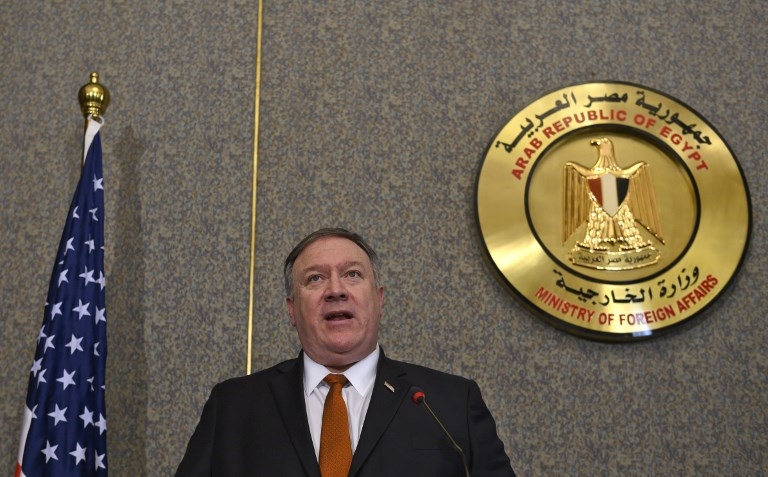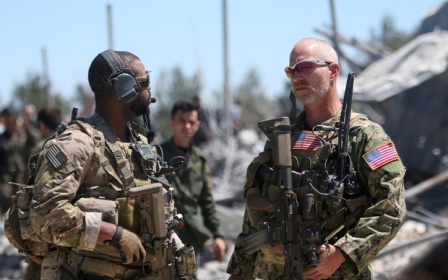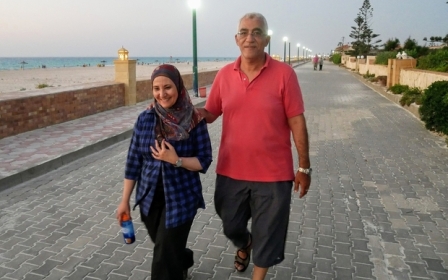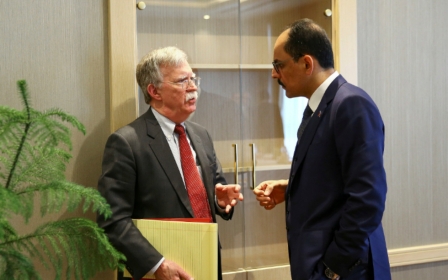'The real new beginning': Pompeo blasts Obama's Middle East strategy

US Secretary of State Mike Pompeo called for regional unity against Iran on Thursday in a speech in Cairo, one of several stops on his regional tour to reassure allies following President Donald Trump’s surprise announcement of a US withdrawal from Syria.
In an address entitled “A Force for Good: America’s Reinvigorated Role in the Middle East”, Pompeo told his invited audience at the American University in Cairo that the United States was embarking on “the real new beginning”.
With those words, Pompeo took aim at the foreign policy of former US President Barack Obama, who delivered a speech in Cairo in 2009 outlining “a new beginning” for his country’s relationship with the Arab world.
The Trump administration has learned from the “mistakes” of its predecessor, the secretary of state said, and would seek to drive "every last Iranian boot" from Syria.
Pompeo rebuked the Obama administration’s approach to the region as “misguided”, blaming it for the rise of the Islamic State (IS) group and for empowering Iran and its allies in Lebanon and Yemen. He said that Obama, who he did not name, “grossly underestimated the tenacity and viciousness of radical Islamism”.
Earlier on Thursday, Pompeo held a joint news conference with his Egyptian counterpart Sameh Shoukry, and stressed the US pullout from Syria would go ahead as planned.
Still, the snap decision to leave Syria, which Trump announced in December, has been widely criticised, with some accusing the White House of abandoning Washington's Kurdish allies in Syria, who have been credited with leading the fight against the slamic State group in the war-torn country.
The announcement led to the resignation of former US defence chief Jim Mattis, and it has highlighted the shaky and often contradictory messages coming from senior officials within the Trump administration - including the president himself, who has waffled when pressed to provide a timeframe for the withdrawal of about 2,000 US troops.
Pompeo defended Trump's decision on Thursday, telling reporters the "decision to withdraw our troops has been made".
"We will do that. We will withdraw our forces, our uniformed forces, from Syria and continue America's crushing campaign," he said.
Speech sparks widespread criticism
Pompeo's speech triggered critical reactions from former Obama officials, including Robert Malley, who served as the White House coordinator for the Middle East under the former president.
In emailed remarks, Malley dismissed Pompeo’s speech as “a self-congratulatory, delusional depiction of the Trump administration's Middle East policy” and said the secretary of state was speaking from “a parallel universe”.
Iran's foreign minister, Mohammad Javad Zarif, mocked Pompeo's assertion in his speech that "when America retreats, chaos follows", saying the opposite is true.
"Whenever/wherever US interferes, chaos, repression & resentment follow," Zarif wrote on Twitter.
"The day Iran mimics US clients & @SecPompeo's "human rights models”—be it the Shah or current butchers—to become a “normal" country is the day hell freezes over. Best for the US to just get over loss of Iran," he wrote.
Martin Indyk, former US ambassador to Israel and Obama's special envoy to the Middle East, said Pompeo's speech "was a shameless attack by a sitting SecState on a former US President before a foreign audience".
"It revealed a woeful gap between Trump’s promises and the means he is using to achieve them; the same mistake Obama made in his Cairo speech 10 years ago," Indyk said on Twitter.
Jon Alterman, director of the Middle East programme at Washington's Center for Strategic and International Studies think-tank, said the secretary of state's comments felt "a little bit as if the approach is to 'talk loudly and carry a small stick'".
"There is a lot of ambitious language, but very little actual commitment of US resources. You could read this as obscuring a continued US retrenchment from Middle Eastern commitments," Alterman told Reuters news agency.
A senior official in the United Arab Emirates welcomed Pompeo's speech, however, saying it was a message of support for allies and friends.
"Secretary of State Mike Pompeo's speech ... is important in supporting regional stability and identifying the dangers faced by the region," UAE Minister of State for Foreign Affairs Anwar Gargash wrote on Twitter, as reported by Reuters.
"Washington, through its secretary of state, is asserting the importance of its alliances and supporting its friends," he added.
Praise for Egypt's Sisi
Pompeo’s speech notably did not make any reference to human rights or democracy as issues that matter to the region’s population.
Instead, he praised Egyptian President Abdel Fattah el-Sisi, for his "vigorous efforts to combat the ongoing threat of terrorism as well as the radical Islamism that fuels it".
Human rights groups have accused Sisi of leading an unprecedented crackdown on his critics, arresting scores of human rights activists, shuttering critical media outlets and keeping tens of thousands of people in jail for political reasons.
Still, Pompeo said the Egyptian president's "leadership, his assertion of leadership, is consistent with Egypt’s historical role as a true leader throughout the Middle East".
"It’s the kind of initiative President Trump asks all nations to take on for the protection of their people," Pompeo said in a joint news conference alongside Shoukry, the Egyptian foreign minister.
Pompeo also urged his country's Middle East partners to forge a unified stance against Iran, and vowed that the US "will use diplomacy and work with our partners to expel every last Iranian boot" from Syria.
That pledge appeared to contradict his boss, however, who said last week that Tehran "can do what they want there, frankly".
“Iran is no longer the same country,” Trump told reporters at the end of a cabinet meeting on 3 January. “Iran is pulling people out of Syria. They can do what they want there, frankly, but they’re pulling people out.”
Pompeo is scheduled to visit Bahrain, the United Arab Emirates, Qatar, Kuwait, Oman and Saudi Arabia as part of an eight-day tour of the region. He already visited Jordan and made an unexpected stop in Iraq earlier this week.
New MEE newsletter: Jerusalem Dispatch
Sign up to get the latest insights and analysis on Israel-Palestine, alongside Turkey Unpacked and other MEE newsletters
Middle East Eye delivers independent and unrivalled coverage and analysis of the Middle East, North Africa and beyond. To learn more about republishing this content and the associated fees, please fill out this form. More about MEE can be found here.




